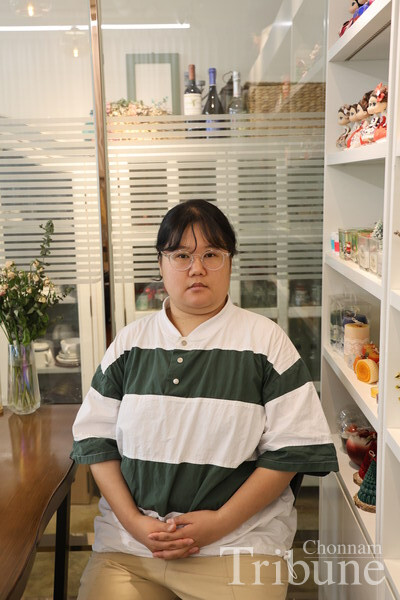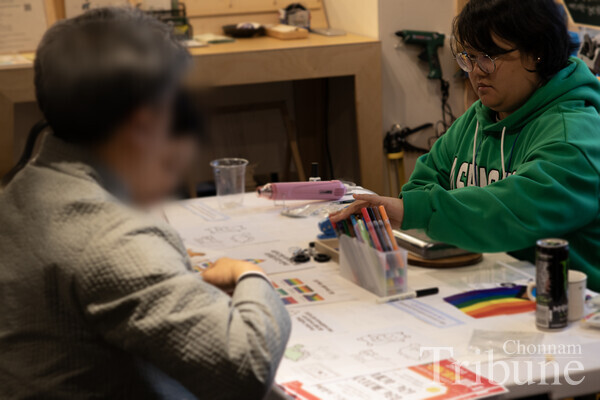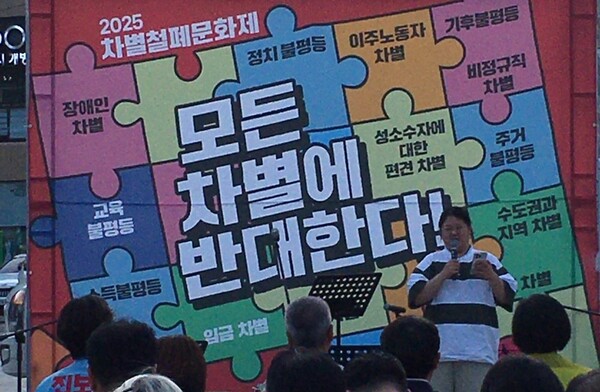In this issue’s People section, the Chonnam Tribune introduces a member of our community who has dedicated herself to assisting those whose needs benefit from a uniquely tailored approach. – Ed.

Preparations are in full swing for the queer parade in Gwangju, returning after a five-year hiatus. The first Gwangju Queer Parade was held in 2018, continuing annually through 2020, when the organization disbanded due to gathering restrictions during the COVID-19 pandemic. In 2025, for the first time in half a decade, sexual minority activists in Gwangju will come together to demand a world free from discrimination. For this issue, the Chonnam Tribune interviewed an activist known as “Kkori,” a member of the Gwangju Queer Culture Festival (GQCF)’s organizing committee.
From Curiosity to Pride
Prior to becoming the member, Kkori contributed to the GQCF as a product designer. Interested in human rights and social issues, she often attended lectures and book talks in an independent bookstore in Gwangju called Girlsbookshop. “I didn’t know there was an organization for sexual minorities. But I got to know about it at that bookstore, and, at first, I joined the organization out of curiosity,” Kkori said. Initially an ordinary activist, she took a more active role in the group, drawing on her background in design, creating promotional goods. Though her involvement began just out of curiosity, she now takes pride in leading an organization that represents the LGBTQ+ community.
Support for Sexual Minorities
Sponsorship is crucial for the organization to operate effectively. The GQCF organizing committee raised funds to host diverse events for the LGBTQ+ community. Initially, they decided to keep their targets low because they did not expect much attention. However, the donation campaign gained much attention on social media, and they raised about 38 million won, surpassing their original target of five million. Reflecting on this, Kkori stated, “I’m grateful to everyone for their interest and support. I think people liked the design of the goods. Large donations don’t always come in easily, so we’ll make good use of what we received.”

The committee plans to focus on preparing for the queer parade, which is the centerpiece of the festival. Events organized for sexual minorities always draw significant public attention. Unfortunately, they frequently face strong opposition from religious groups, and as a result, events are sometimes canceled or are unable to proceed as planned. She added, “We’re not doing this just for the sake of holding events. We’re also expressing our voices to the public, with the same freedoms to assemble and share our beliefs that everyone else has. These are rights guaranteed to all Korean citizens, and our hope is simply to promote greater tolerance toward minorities in our community.”
Differences, Not Mistakes
Born in the 1980s, Kkori says that society is becoming more accepting of sexual minorities. She noted there was no information in the 1990s, but as time goes by, sexual minorities have begun to appear in many forms of media, and she feels that people’s views are changing. She is one of a growing number of Koreans who believe that marginalized groups, including sexual minorities, should gain greater protection of their rights within the community. The hardest thing about living as a sexual minority is seeing many people take their own lives due to social intolerance and exclusion from life’s basic joys.
Nevertheless, the world is changing, and Kkori told the Tribune, “Though there are many people who are against us being who we are, there are also those who care about and support us. These generous donations reinforce my confidence in that. Even religious groups can empower us in some places. The Okhap Church holds meetings for parents of sexual minorities once or twice a month and provides a place for our meetings, too. We gain strength from these great friends and make good memories.” Kkori and her community hope to be thought of as just other people, not as antisocial villains. She shared, “I dream of a day when I can be acknowledged for who I am—free to be myself even in public. In a world where everything is different, where we are normal.”
Protecting LGBTQ+ People from Discrimination
Kkori said, “Sexual minorities face a lot of injustice in society. We cannot bask in the conventional social system. Currently, society is changing a lot. Many countries give sexual minorities the same social status that others have. It’s time for Korea to change, too. I hope anti-discrimination becomes a natural part of the community. We don’t want rights that we should enjoy to disappear for religious or political reasons.” The intensity of social change and resultant phenomena make living as a minority in society more intense than many people think. Our aim is to foster a slightly more tolerant society.

She stated, “Our goal is to make it known that sexual minorities are also ordinary people and to publicize this fact. We will continue to promote our right to exist through diverse activities. I would like to ask our opponents why they wish to drive us out of a society where freedom is valued.” The committee will actively conduct lectures and educational programs, envisioning a society where minorities facing social pressures can live in a more supportive world.
By Ok Hui-kyeong, Reporter

